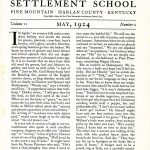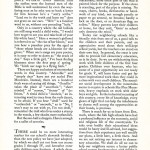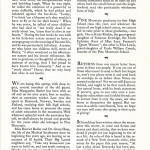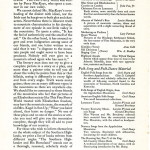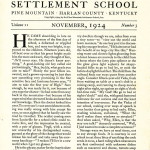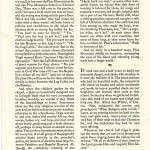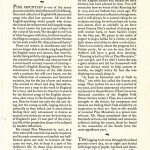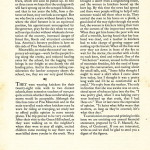Pine Mountain Settlement School
Series 17: PUBLICATIONS PMSS
NOTES 1924
May and November
NOTES – 1924
“Notes from the Pine Mountain Settlement School”
May and November 1924
GALLERY: NOTES – 1924 May
“The literary man does not try to give a complete picture and a story or a play, any more than a painter tries to tell you all about the valley. He paints from this or that hillside, seeing it differently in every light and from every angle. Truth wears many guises; there are as many different types in the mountains as there are anywhere else.“
“There could be no more interesting marker for our school’s eleventh birthday than the new policy we have just adopted, by which we shall cut out from our course grades I through IV, and hereafter enter only children over fourteen. A whole chapter of our history is closed.”
- NOTES – 1924 May, page 1. [PMSS_notes_1924_may_001.jpg]
- NOTES – 1924 May, page 2.[PMSS_notes_1924_may_002.jpg]
- NOTES – 1924 May, page 3.[PMSS_notes_1924_may_003.jpg]
- NOTES – 1924 May, page 4.[PMSS_notes_1924_may_004.jpg]
TAGS: NOTES – 1924 MAY: linguistics, Old English, school’s birthday, death of Harry Callahan, literature, Denmark, Cecil Sharp, Marguerite Butler, Harriet Butler, Dr. Grace Huse, Angela Melville, Elva Lewis, William Creech, Solomon Everidge, Percy MacKaye, Southern Highlands, books, folksongs, folk dancing, Kitty Ritchie, Lucy Furman, Elva Lewis, Sun Up play, theater, Lucille LaVerne, This Fine Pretty World
TRANSCRIPTION: NOTES – 1924 May
P. 1
NOTES FROM THE
PINE MOUNTAIN
SETTLEMENT SCHOOL
PINE MOUNTAIN * HARLAN COUNTY * KENTUCKY
Copyright, 1924, by Pine Mountain Settlement School
Volume II MAY, 1924 Number 2
“IN Aprile” we country folk make a sunshine holiday and search the woods for greens: plantain, crow-foot, bear’s lettuce, cow’s glory, woollen breaches, even spring beauties go into the basket. We know no more of grocers and head lettuce and forced spinach than did our Anglo-Saxon fore-parents of a thousand years ago. So it is no wonder that we have kept their old word for greens, leaf and blossom together, and hunt us with relish “a bait of sallet,” Just as Mr. Cecil Sharp found here, the Running Set, parent of the English country dance, so long obsolete, words still link us closely to Chaucer and Spencer and Shakespeare. “Watch out,” says a friendly small boy, “A copperhead uses in that rock-heap.” Dekker wrote, “I will give thee for thy food, no fish that useth in the mud.” When we say the baby is, “peart,” we don’t mean she is a pert little miss, but lively and brisk; so Milton talked about the “acutest and pertest operation of wit and subtlety.” He, writing of “Meadows trim with daisies pied,” would never laugh at us for talking about, “the old pieded cow.“
It is not safe to venture a laugh at our uncouthness to speak in such excellent company. Suppose we do offer you “chicken sop,” or “red sop” in lieu of gravy; Chaucer wrote one of his pilgrims “Well loved he in the morn a sop of wine.” It might have been his Nonne Priestess who said, ” Hit’s been a God-almighty time since I went to an election,” Instead of an eleven-year-old member of our school. Supposing we are all. “scrouged up,” instead of crowded; no less a person than Spencer wrote in The Faerie Queene, “Having scrouged out of his carion corse the lothful life.” We still use the plural in e-s, and talk of postes, and wastes and beastes. Sometimes, when we are a little confused or excited we redouble our plurals and say beastetes.” We are not slipshod when we “ax questions,” nor Cockney, when we say, “Hit” for it, — we are simply old fashioned, as old fashioned as Piers Plowman, antedating Magna Charta.
But as modern Shakespeare. We invite you to a frolic and hope you’ll feel anticky. Did not Hamlet “put an antick disposition on”? “Talk,” and “buss” are two words in our lover’s language as they were in his. Trust him to know what our neighbor meant who asked if he could borrow our post-hole digger, “if it “won’t disfurnish ye none,” Trust him not to raise surprised eyebrows at our double negatives, or correct the little girl who hoped that her Christmas stockings would hold a poppet., but said philosophically, “I don’t aim to want nothin I haint got no-how.” He, himself, might have said our first settlers came into this country “a-perusin it for game.” The great William’s fools wore motley; here Mammy picks up the baby and says, “Hit’s motley faced; I ain’t had no time to clean hit”. The other day a woman was talking of the rude folk who had packed liquor down the branch she lived on. Said she, “They hopper hit up in boodgets so hit looks like a poke of beans.” A budget used to be a “pouch” — big or little, not a carefully considered way of spending money. You remember Autolycus’ song, “If tinkers may have leave to live, and wear the sow-skin budget, then my account I well may give, and in the stocks, avouch it.”
[1]
P. 2
The King James version does not have to be brought up to date for us. There is nothing flowery to our ears in Peter’s phrase “While the ark was a-preparing.” We are on speaking terms with that little “a” every day of our lives and go a-walking in plain prose as some folks go a-maying in poetry. We talk of “divers” matters. That the scribes were the learned men of the Bible is well understood by even the wayfaring man as he asked you to back a letter for him because he’s a “sorry scribe.” “Lead me in thy truth and learn me” does not grate on our ears. “Writ” is a familiar word to us without any preceding “holy.”
Only a country where the old ballads are still sung would a child write, ” I would love to see you and take hold of your lily-white hand.” Here a woman’s girlhood is referred to as the “rise of her bloom,” and you hear a preacher pray for the aged as those whose “heads are a bloomin for the grave.” When one’s songs are pure poetry, it’s easy to refer to dawn as the “crack of day.” Says a little girl, “I’ve been finding blossoms since the first peep of spring.” We “hitch our nags to a flying limb.”
There are happy exclusions of our overworked words in this country. “Adorable,” and “simply dear,” have not yet scaled Pine Mountain. Instead there are 100 fresh ways of saying old things. “Ontellin” takes the place of “uncertain”; “short minded” of “moron,” [and] “frenzy” of “delirium.” A timid child is “dauncie,” and interesting word to trace from the verb daunt, to be afraid. If you hear “droll” used for “outlandish” or “uncouth” as in “No, I won’t stay to eat with ye I’m too droll,” remember the troll who lives under a stump in the woods a few shades more outlandish. But the sun-ball is draping. Here is enough for a sallet of savories.
***
There could be no more interesting marker for our school’s eleventh birthday than the new policy we have just adopted, by which we shall cut out from our course grades I through IV, and hereafter, enter only children over fourteen. A whole chapter of mountain history is closed. There is now a county school system worthy of the name, and most children can get the beginnings of their education in a one-room country school. We are reaping the fruits now of the new law advancing the requirements for teachers’ certification. More and more, alert young men and women from such institutions as Berea are putting life into the district school. Six years ago, our Pine Mountain supervisor wrote to the school’s she visited, “Occasionally there is one small blackboard; more often part of the wall is painted black for the purpose. If the stove is standing, part of the pipe is missing. No maps, charts, books, dictionaries or handwork of any kind; not enough pencils or paper to go around, no brooms; hardly a lock on the door, or an American flag; No toilets.” Many parents kept their children at home, for they said,”Goin’ to school only destroys the mind.”
Today our neighboring schools like a friendly visit from one of us, a good talk to the children and their parents, and an appreciative word about their well-kept school yards, but the teachers can stand on their own feet. In general, the state is now able to provide fair elementary education, as is its duty. So, we are withdrawing from work with little children of the first four grades. Children over fourteen, who because of a poor opportunity are not ready for grade V, will learn faster and get far more inspirational work than they could in a class with very small children. The soundest social development in the mountains seems to require in schools like Pine Mountain, heavy emphasis on work with older boys and girls. In the industrial recasting of this country, every bit of knowledge, every gleam of light that can help the inhabitants to choose well among the opportunities at their hands, is precious.
There is much for us to learn from Denmark, where the folk high schools have had a profound influence on the economic, social and religious life of the countryside. To take over bodily their educational ideas would be hasty and ill-advised, but suggestions from their experience can well modify our plans, a little here, a little there. And we are not retiring our interest in elementary education. We shall do all we can to help our neighbors secure a better public school system for themselves, with delight in the great improvements of the last ten years.
***
Our family life at Pine Mountain have been quickened as well as bereaved by the…
[2]
P. 3
…death of Harry Callahan, One of the family of seven who have been with us so many years. Harry died in December, as a result of an injury early in the summer. We remember so many things about him, — his excitement over a new storybook, his faculty for gathering all the news of the creek, his alert little mind, his companionable ways and bubbling laugh. When he was eight, he called the attention of a passer-by, to some daffodils, which he had picked and balanced against the bee-hives. “Looky, I’ve fotched ’em a blossom so’s they wouldn’t have to fly so far for their honey.” When he was seven, he talked of some children who had died as “not really dead if we study about ’em, ’cause they’re alive in our hearts.” During the last weeks, he was with us his little-boy nature seemed to have a strange grasp on the meaning of his own life, and he was particularly full of joy. A minister who knew our children well, wrote of Harry, “I often wondered at his affectionate nature and his innate refinement. He was so gracious, so thoughtful of others, so desirous of serving, that I feel proud to have known him intimately.” And so we “study about” Harry, that we may keep him alive in our hearts.
***
We are losing this spring, with deep regret, several members of the old guard, Miss Marguerite Butler has been with us off and on for nine years, first as teacher, then as extension worker. Last year she spent in Denmark, Norway, Sweden and Finland, studying their folk high schools, and has come home to promote the cause of adult education in the mountains. With whatever splendid work she associates herself, we shall always be proud and grateful for the years when she belonged to Pine Mountain.
Miss Harriet Butler and Dr. Grace Huse, the life of the Medical Settlement since its beginning five years ago, are leaving us on account of ill health. Their Big Laurel neighbors say, “Take any house-seat you want to build on, and just settle among us. Maybe we can get us another doctor, but where can we get friends like you?” To write of the happy changes that have come about through their friendliness and wisdom would fill a book, but “their works do follow them.”
***
MISS Angela Melville, who was one of Pine Mountain’s workers for three years, has come back to the mountains as the Kentucky organizer for the National Credit Union Extension Bureau. Miss Melville is a fit choice for the work of establishing credit unions in rural communities where mutual confidence needs to be built up and where both the small farmer and the neighborhood need this particularly wholesome form of help.
***
PINE Mountain graduates its first High School class this year, and whatever the future of our high school course, we cannot fail to take pride in these graduates, — two girls. One is Kitty Ritchie, the great-granddaughter of Solomon Everidge, the Uncle Ephraim Kent of Miss Lucy Furman’s “Queer Women”; The other is Elva Lewis, grand-daughter of Uncle William Creech, founder of the Pine Mountain School.
***
RETURNS from our recent letter have come in from 220 people. If you are one of those who meant to send a check but forgot to, won’t you please write it and send back an envelope to us before these Notes are snowed under too? For we are still $2500.00 behind, and ought to be that much ahead. Our annual. letter, with its frank’s statement of poverty, goes to you only once a year. Regular subscribers and faithful friends are to extract from it only the news, not take home to themselves the appeal. But our once-in-a-while contributors, how we hope our turn will come this spring in their cycle of giving!
***
SO much has been written about the mountains this winter, in verse and fiction and drama and short articles, that we have wondered if people are not beginning to tire of us a bit. An echo of this is heard in the remark of a New York dramatic critic, who wrote for his paper this past season, “At last, a play about Kentucky has been produced, which is not laid in the Cumberlands and does not have for its plot moonshine and shootings.” This winter, there have been four mountain plays, all drawing full houses in New York. Sun Up has run since August, and is chiefly distinguished by the…
[3]
P. 4
….splendid interpretation of an old mountain woman given by Lucille Laverne; the Shame Woman is by the same author. Of Hell-Bent fer Heaven, one friend writes us that it is a splendid mountain play, while another equally discriminating and well informed, says it is “Pure New York melodrama.” This Fine Pretty World was written by Percy MacKay, who spent a summer in our own valley.
We cannot defend Mr. MacKay’s overloading of the dialect with idiom, nor the Irish cast he has given to both plot in characters. Nevertheless there is inherent truth to mountain characteristics in his development of one episode in one little valley in the mountains. To quote a critic, “It has the feel of authenticity and the smell of the soil.” On the other hand, it has aroused regret and even indignation among some of our friends, and one letter written to us, said that it was, “... a disgrace to the mountain people and ought never to have been produced. Nobody will ever give to a mountain school again who has seen it.“
The literary man does not try to give a complete picture in a story or a play, any more than a painter tries to tell you all about the valley he paints from this or that hillside, seeing it differently in every light and from every angle. Truth wears many guises; there are as many different types in the mountains as there are anywhere else. We should like to commend to those friends of the mountains who feel that pictures of an Elizabethan society like This Fine Pretty World treated with Elizabethan freedom, may hurt the mountain cause, the remark of old Mrs. Kagle in Sun Up; “Whar you haint afeared, thar haint no danger.” No one of these plays and no one of the stories or articles you read will give you the mountains complete, though they will all add to your knowledge of our country.
For those who wish to inform themselves on the whole subject of the Southern Highlands, we print a list of books written from different angles, “The Southern Highlander and His Homeland” stands out as a thorough, reasoned, scholarly study of the mountains. The list is of necessity is incomplete,
| The Southern Highlander and His Homeland – John C. Campbell | FOLK-SONG AND FOLK-DANCE MATERIAL |
| Our Southern Highlanders – Horace Kephart Entertaining, well written and true to life. |
English Folk Songs from the Southern Appalachians – Cecil Sharp and Olive Dame Campbell An exhaustive and scholarly collection of the wealth of folk-song material found in the mountains of Tennessee, North Carolina and Kentucky. |
| The Southern Mountaineers – Dr. Warren Wilson | Folk-Songs of English Origin, the Appalachian Mountains – Cecil Sharp American-English Folk-Songs – Cecil Sharp Two small harmonized collections. |
| The Land of the Saddlebags – James Watt Raine | Lonesome Tunes – Loraine Wyman and Howard Brockway Twenty Kentucky Mountain Songs – Loraine Wyman and Howard Brockway Miss Wyman and Mr. Brockway collected their material from the countryside around Pine Mountain, with the school as headquarters. |
| Blue Grass and Rhododendron – John Fox Jr. Courtin on Cutshin – John Fox Jr. Christmas Eve on Lonesome – John Fox Jr. Early Stories, more carefully done and more free from sentimentality than the better-known novels. |
Nursery Songs From the Appalachian Mountains – Cecil Sharp Two volumes, illustrated with silhouettes, fascinating for small children. |
| Almetta of Gabriel’s Run – Louise Murdock A picture of mountain custom, idiom and superstition with a slight connecting thread of story. |
The Running Set, Part V of the English Country Dance Book – Cecil Sharp A technical description of our dance, with an illuminating introduction by Mr. Sharp. |
| Mothering on Perilous – Lucy Furman Quare Women – Lucy Furman Pictures of the Hindman Settlement School, the fore-runner of Pine Mountain, in the very early days. |
|
| Kinfolks – (verse) – Ann Cobb | |
| Old Christmas (verse ) – Wm. A. Bradley Singing Carr (verse) – Wm A. Bradley Stories which appear from time to time in the Atlantic Monthly, done with rare appreciation, restraint and humor. |
|
| Highland Annals – Olive Tilford Dargan Stories which appear from time to time in the Atlantic Monthly, done with rare appreciation, restraint and humor. |
GALLERY: NOTES – 1924 November
America’s forestry problem is here on this side of Pine Mountain, in a nutshell.
Pine Mountain is one of the many places touched by the influence of Cecil Sharp, the noted collector of English folk dances and songs who died last summer.
- NOTES – 1924 November, page 1. [PMSS_notes_1924_nov_001.jpg]
- 1924 November, page 2.[PMSS_notes_1924_nov_002.jpg]
- 1924 November, page 3.[PMSS_notes_1924_nov_003.jpg]
- 1924 November, page 4.[PMSS_notes_1924_nov_004.jpg]
TAGS: NOTES – 1924 NOVEMBER, oculists, Election Day, Chapel, Baptists, dedication of Chapel, Rev. Alfred Lee Wilson, Cecil Sharp dedication, ballads, Victrolas, Playford’s English Dancing Master, folk dancing, English Folk Dance Society, logging train, forestry, extension teachers, knickers, Green Hill School, Auditor G. F. Mansell
P. 1
NOTES FROM THE
PINE MOUNTAIN
SETTLEMENT SCHOOL
PINE MOUNTAIN * HARLAN COUNTY * KENTUCKY
Copyright, 1924, by Pine Mountain Settlement School
Volume II NOVEMBER, 1924 Number 3
HE CAME shambling in late on the afternoon of the first day of school, a deformed or crippled boy, and none too bright, it appeared to the children. Nineteen years old, all bent over so that his great height made him the more awkward, they thought of him, “He’ll never stay. He doesn’t know anything.” A good-looking old boy called out patronizingly, “Hey, buddy, what grade you aim to take?” Slowly the poor fellow answered, and a grown-up coming by just then saw something very promising in the fine sensitive face and luminous brown eyes, “I aim to take the first year of High.” Sure enough, he was ready for it, not because of any superior chance — he had come from way back in the mountains — but because of his eager mind that devoured books and searched out knowledge. Then the doctor looked him over. To everyone’s vast astonishment nothing was really wrong with him except his eyes, so near-sighted that he hardly saw the road he travelled. The oculist coming soon from Louisville for a school clinic could remake him, and the impression he created, with a pair of glasses. Virgil, with a mind not unworthy of his distinguished name, guessed at the glory of the change that would release his real self and take away his enormous handicap — “I reckon I’ll live in a new world when I get my glasses.”
He is the phrase-maker for the inarticulate children at Pine Mountain, whose lives are changed just as vastly if not so obviously — the old-fashioned ones from the ridges and valleys, the mining camp children from the Cumberland and its branches. Many a child from a lonely homestead comes to us — country dwellers though we are, miles from even a tiny town — to “view out the world and learn manners.” As one boy put it in discussing his younger brother, “He haint never had the benefit of no large city like this.” Running water and electric lights gleaming from a dozen houses are marvels to the child from a home where the fatty pine splinter or the fire glow gives light a-plenty for sleepy-headed folks to go to bed by, or cook the before-daylight breakfast. The child from the railroad finds our ways queer from another angle. Consider fifteen-year-old Viola, fresh from waiting on table at a men’s club in mining camp, and running to cheap movies night after night, up against an eight-o’clock bed-time rule. “My God! Me go to bed at eight o’clock!” said she, with good-humored tolerance for our notions and not the least intention of irreverence. For the Violas of our school, making over ways of speech is even harder than going to bed early. Ellen, washing windows, exclaimed, “What the devil makes these windows so streaked?” And when asked, “Why, Ellen, is that the way you talk?” demurely answered, “Well, I just wanted to make a complete sentence!”
Strange ways we have at meal times, not to say strange foods. It is courtesy in our school to eat three bites of anything the cook sends in to us, a hard ruling when newcomers are first confronted with unknown dishes such as macaroni and cheese, tomato soup or fruit gelatine [sic]. Surprisingly enough, this consideration of the cook’s feelings usually results in requests for full servings, and then, second helpings. In the same way children take on a preference for forks rather than knives as vehicular instruments, the practise…
[1]
P. 2
…of light conversation during meals, and a habit of sitting up straight. One little boy said soon after his arrival, “I heerd you-fellers didn’t foller layin’ your arms on the table, when I was back on Cutshin, so I quit before I come.”
More than a mere generation and a country road lay between the Pine Mountain polls and the Pine Mountain School on Election Day. There was a full vote in the precinct, solely because a local stock law was an issue, and the voting was along strictly party lines. What did the mother who had come six miles with a three weeks’ old baby know of policies and candidates, as she asked the election clerk to stamp her ballot for her. “You want to vote for Davis?” “Yes.” “That aint the way to ask her,” said the election judge hastily. “Do you want to vote for the Rooster or the Log Cabin?” “Oh, the Log Cabin,” she said at once. But at the school the current events classes discussed even platforms with animation. Nearsighted Virgil wanted Davis “because I like his foreign policy.” And the LaFollettans were full of good reasons for their choice. “Do you suppose just because I’d have voted for Lincoln in Civil War times I’d vote the Republican ticket all my life?” said one of them. Election Day will never be for these children simply a choice between the Log Cabin and the Rooster.
And when the children gather in the chapel, a place so beautifully designed and so lovingly built that its very atmosphere breathes worship, we wonder if they think of the funeralizings at home. Sometimes these are the only religious services of the year and are held outdoors in pretty weather, otherwise in the schoolhouse. Dogs wander in and out, mules tied nearby lift up their voices, babies cry, and boys and men stroll about freely, gathering just a little distance off, perhaps to swap horses or sample moonshine. Two or three hymnbooks must do duty for everyone. A small group of theologically minded listen intently to the preacher’s points, for matters of doctrine loom large between Primitive and Regular Baptists. Although the customary intoning of the preacher lulls many of the congregation to drowsy inattention, most of the group is reverent, and the old-fashioned people find full satisfaction for their religious natures, but the younger folk more and more crave a religion that relates doctrine to life, and emotion to thought. Sometimes they can feel no respect for the preacher, knowing far too much about his traffickings in moonshine or his mean maneuvers. Pine Mountain needs to open a new world for the hearts of its children, even more than for their eyes and minds. When they lift their voices, singing “Hark, hark my soul,” or some other wonderful hymn, we rejoice that this form of worship is beloved by them, for songs and responsive services and simple, helpful talks are a part of our life here. Better still, when a visiting preacher comes and can give a talk full of Christian idealism. One such has just been among us, who made the boys, even the doubting Thomases, say, “He’s a regular feller, ain’t he?” At such times their hearts are filled with new emotions, and some of them long, as they never have before, to follow St. Paul’s admonition, “Walk in newness of life.”
And so, daily in a hundred ways, Pine Mountain fulfills its function, unstopping the eyes of the blind and releasing young souls into a larger world.
***
IT took two and a half years to build our memorial chapel, and those who worship in it were the builders of it. The stone-masons who laid its beautiful walls, the carpenters who fitted its beams and oaken woodwork and made its heavy panelled doors are our neighbors and learned their craft at this school. So the day when we gathered to dedicate this work of our hands was a high and holy one. Rev. Alfred Lee Wilson, of Canton, Ohio, conducted the service and preached on “What Religion adds to Life.” Later, at an evening service he held for the boys and girls only, twenty-four of them told him of their wish to lead the Christian life, and the dedication day had its own meet offering.
Whenever the church bell rings it peals out the words that are cast in its bronze and sends them ringing down the valleys for all to hear: “Oh all ye children of men, bless ye the Lord; praise Him and magnify Him forever.”
MR. WILSON, writing back after his visit to dedicate the chapel, says, “The religious work, symbolized by the beautiful new church building is not sectarian, but vitally…
[2]
P. 3
…Christian, and the kind of Christian character your school is building into the lives of the splendid mountaineer boys and girls is a real contribution to the best life of America. In the language of our mountain friend, ‘you’re puttin’ in a powerful lick’ not only for education, but for the Kingdom of God.”
***
PINE MOUNTAIN is one of the many places touched by the influence of Cecil Sharp, the noted collector of English folk dances and songs who died last summer. All over the English-speaking world people who dance the dances he rediscovered and sing the songs he found mourn his loss and pay tribute to the value of his work. We thought to tell you of what has gone with him, but find ourselves dwelling on our gain, and what better thanks for his work would Mr. Sharp himself desire?
From old women in almshouses and old men no longer able to shake a leg he gathered his English tunes and dances, that were [literally] dying with the dying generation. From the mysterious symbols and obscure text of a seventeenth century manual of dancing — Playford’s English Dancing Master — he reconstructed the science of the folk dance with a patience few will ever know, not for the information of museums and historical societies, but for the joy of men and women who wanted to dance and sing themselves. The war put a stop to his work in England for a time, and he came to America to search for the kindred songs of his English discoveries, shut away in the Southern Appalachians. Here he found not only the old and dying, but the young as well, singing almost as naturally as they talked and in some places finding their only amusement in dances as ancient and elaborate as any he had dug out of England’s past. It was part of the everyday life of the people, but about to be eclipsed by modern influences.
He visited Pine Mountain in 1917, at a time when folk material was easily acquired, and he made conscious and explicit our half-formed plans not only to treasure all that came our way, but to keep it a part of the children’s life. In those days almost every child brought in a new ballad, or a new variant of some lovely song, or a new figure for a set or singing game, but few had ever been written down. Pine Mountain, he said, should be the friendly soil in which all that belonged to us should be kept alive, and all the allied English songs and dances should be planted — a center for English and American folklore.
Line Fork and Leatherwood and Cutshin Creek have Victrolas now, and from the mining camps across the mountain come children used to jazz and cheap movies. But our native crop at Pine Mountain, supplemented by the English dances and ballads we have learned, has been planted in time. You will remember how we wrote of the Running Set in 1919 and our ballads two years ago. We have our own printed collection of songs now, and it will always be a natural thing for us to dance and sing, for we have kept our tunes and dances alive as carefully as we have saved Granny Day‘s method of dyeing yarn with walnut bark, or Aunt Sarah‘s recipe for the blue pot. We pause in the midst of supper to sing a ballad for a visitor, or push back chairs and tables to show a new dance. There is no anxiety about the program for a Friday party, for we can be sure that the children will have a good time dancing. “Dancing is half my life at Pine Mountain,” says one girl, and if we didn’t know she was a good student and did her housework well and was always ready to help anyone in trouble, we might worry for fear she was thinking too much about it.
“As keen as December and as fresh as May,” one critic has called the dances and songs. They restore for us a naive period of our past, and loose undreamed of powers of enjoyment in the performer. (There are seven thousand members of the English Folk Dance Society today.) They are a source of strength to the future, for composers and dancers are finding their fresh simplicity an inspiration to their art. And to this wealth of material Pine Mountain is a proud contributor. Mr. Sharp considered that of the hundreds of tunes and ballads and dances he collected during his career, those he found in the mountains of the South form the most significant part.
***
THE logging train runs through the school grounds every day, six or eight cars loaded with huge logs of poplar, hemlock and chestnut, bound for the saw mill yon side of Pine Mountain. At the head of Isaac’s Run, where a few months ago you lost yourself in thickets of rhododendron and laurel, and ventured into real forest for rare ferns and wild flowers, is the new camp. The mountain…
[3]
P. 4
…sides are being cleared of ripe timber, and with each big tree’s fall many young saplings are carried to the ground. Great piles of brush burn along the tracks.
In an early gift of land to the school, the lumber company reserved the right of way through our grounds for a temporary line of track, which will soon be pulled up. In two or three years we hope that the undergrowth will have sprung up on the scraped hillsides, and that in ten years the hills, from a distance at least, may not look so ravaged. But we who live in a state without forestry laws, where the chief forester is in an equivocal position, his appointment unrecognized by the governor, pray for the day when we may sell our ripe timber without wholesale devastation of the country, increased danger of forest fire, floods and attendant economic loss. America’s forestry problem is here on this side of Pine Mountain, in a nutshell.
Meanwhile, we make the most of our temporary advantages — work for the people living along the creeks, and reduced hauling rates for the school, for the logging train brings in our freight at one-fourth the old hauling price. And in the never-failing consideration the lumber company shows the school, too, they are our very good friends.
***
THEY were wearing knickers for their twenty-eight mile walk to two distant schools, these extension teachers of ours, not quite certain whether these comfortable garments would be acceptable. Although the time has come at Pine Mountain and on the main travelled roads when knickers may be worn for riding or tramping, we study not to offend public opinion in more remote places. The trip proved to be very eventful. After their visit to the Green Hill school, as they were walking on to the neighbor’s where they were to stay all night, excited children came running to say there was a man killed down yonder in the creek. They hurried after the children and found the man not dead, but sitting in the water with his leg broken. He had been hauling lumber, the wagon tongue had broken, and he had been thrown into the creek. No help anywhere. The country teacher went to find a board they could use for splints, somebody brought a sheet from a neighboring house, and the women in knickers bound up the hurt leg. By this time the news had spread and there were people willing to help if only someone would tell them what to do. They carried the man to his home on a plank, a good deal of the way right through the creek bed, the women in knickers taking their turn at the corners of the improvised stretcher. When they got him home the poor wife was all of a tremble, having heard that her husband was dead, and a teacher in knickers had to take charge of getting supper and making up the biscuit. When all the fuss was over they sat down in front of the fire to wait for the doctor, the mother with a baby on each knee, tired and relaxed. One of the “fotched-on” women, unused to the silences of mountain firesides, felt the need of keeping up the conversation, and casting about for small talk, said, “Some folks thought I ought to wear a skirt when I came down here today, but I thought it was a pretty long walk and I’d be as comfortable as I could.” No reply from the mother. The only indication that she was awake was an occasional spurt of tobacco juice into the fire. “I was pretty glad, when I was helping carry your husband up that creek, that I had these on.” Then at last came the expression of opinion. “It haint what folks wears that matters, so long as they’re covered; hit’s what they does.”
To economize on space and printing in this issue we are omitting our annual financial statement, prepared by G. F. Mansell, Auditor, of Cincinnati. If you are interested, write us and we shall be glad to send you a digest of the figures.
[4]
Previous:
NOTES – 1923
Next:
NOTES – 1925
See Also:
MUSIC and DANCE Guide
RELIGION Guide
Return To:
NOTES Index

